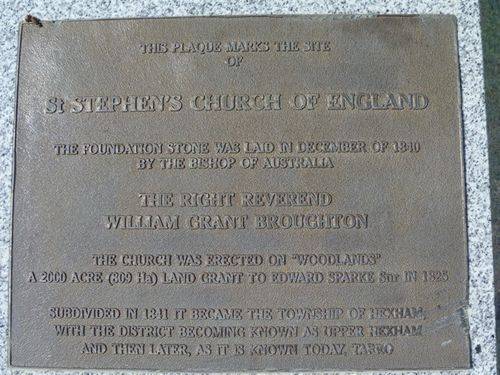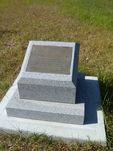
St Stephen`s Church of EnglandPrint Page 
The plaque marks the site of the Anglican Church of St Stephen`s. The foundation stone of the church was laid in December 1840 in Tarro, NSW. The church was rebuilt in the early 1900s. It was later removed in the 1970-80s. This site was used for Tarro traffic interchange. The monument was put in place around the time the interchange was opened in 1996.
St Stephen's Church of England was one of the first Anglican churches in the Hexham area in the lower Hunter region of NSW. The original church was located on the Newcastle-Maitland road. There was a parsonage behind the original church, thought to have been occupied in its early days by the Rev. Robert Thorley Bolton. This would have been the childhood home of Mary Windeyer (nee Bolton), who married (Sir) William Charles Windeyer there on 31 December 1857 . The Windeyer estate was in Tomago across the Hunter River from (lower) Hexham.
Around 1905 the original church was replaced by a new wooden church. In the 1950-60s this was joined by a church hall slightly to the east. There was a tennis court slightly to the west. In the 1970s a youth club was build on the site of the tennis court. In the 1970-80s the buildings were removed. Eventually the Tarro interchange was build on the site. The interchange was opened in 1996.
Location
| Address: | Tarro Interchange & Anderson Drive, Tarro, 2322 |
|---|---|
| State: | NSW |
| Area: | AUS |
| GPS Coordinates: | Lat: -32.81 Long: 151.666111 Note: GPS Coordinates are approximate. |
Details
| Monument Type: | Plaque |
|---|---|
| Monument Theme: | Culture |
| Sub-Theme: | Religion |
Dedication
| Approx. Monument Dedication Date: | 1996 |
|---|
This plaque marks the site of St Stephen`s Church of England
The foundation stone was laid in December of 1840 by the Bishop of Australia the Right Reverend William Grant Broughton
The church was erected on "Woodlands" a 2000 acre (809 ha) grant to Edward Sparke Snr in 1825
Subdivided in 1841 it became the township of Hexham with the District becoming known as Upper Hexham and then later, as it is known today, Tarro






